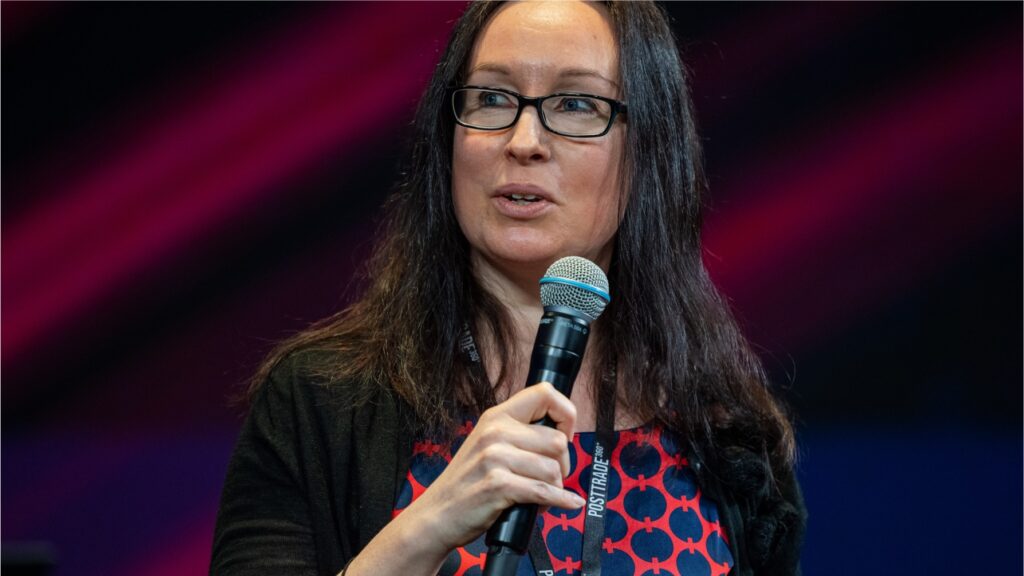INTERVIEW | Fending off operational threats, market crises and technological upheaval, has meant a tough journey for all sorts of post-trade actors through the last five years. Industry advisor Virginie O’Shea sees it having made them stronger. Read this fifth lookback article in our series.
PostTrade 360° Copenhagen on 11–12 October 2023 will mark the five-year celebration of the brand. Virginie O’Shea joins there, with the panel ”T+1 – Global opportunities, threats and how you can future proof for T+0”. Find the conference website here.
This five-year review interview is our fifth in a series.
“No doubt, resilience has been one of the biggest focuses, from many angles: not just operational resilience and cyber security but also the resilience of the markets and how we’ve managed to weather through so many ‘black swans’,” says Virginie O’Shea.
My 5-year observations
Virginie O’Shea, Founder, Firebrand Research
• Resilience – against growing cyberthreats as well as the surprisingly frequent “black swan” events in the market.
• Digitalisation – Infrastructures, banks and asset managers move in the direction of digitalising processes, at varying levels of maturity.
• Innovation in asset classes, including tokenisation of assets.
As examples, she lists the resilience of financial institutions to come back from hybrid working, dealing with many changes to how we operate.
“In cyber security, the geopolitics has been a big resilience aspect, too. Looking at nation state activism on the cyber-criminal front, there’s been a lot more funding thrown at cyber criminals from Russia and the like. So, we’re seeing much more innovation on the part of cyber criminals and how they attack various institutions. It’s run like a business … it’s quite terrifying.”
Emedded in the tech stack – and culture
The second dominant theme Virginie O’Shea sees is process digitalisation and transformation – how we are trying to modernise systems, whether at market infrastructures, banks, or asset managers.
“We’re trying to modernise things that haven’t been touched for a very long time in post trade. A lot of those systems are heavily embedded in the infrastructure of a firm, and they’re also sort of culturally difficult to change.”
Some of the change initiatives serve to “lift and shift” solutions onto cloud platforms, others move paper-based or manual processes onto some higher degree of automation. Some shifts are technically advanced but many quite simple. Replacing wet-ink signature processes by digital signatures is freeing up a lot of efficiency, prompted by the Covid-19 pandemic.
“It’s amazing that we’ve had so many paper-based processes for so long – and the fact we still have faxes and things like that. Corporate actions and certain areas like that still need to be addressed. But in asset servicing overall, this is evolving.”
Still up against practicalities
The innovation in client services around different asset-classes makes for a third broad trend. Like several other commentators in our lookback series, Virginie O’Shea sees the DLT-based tokenisation having emerged slower than many expected, but still highlights it as a transformative force.
“We’re still struggling with some of the practicalities of tokenisation. There are so many bits we don’t have: We don’t have central bank digital currency to be able to settle the payments leg, and we don’t have digital identity to be able to deal with the KYC aspect. We don’t have regulatory certainty or real understanding of how these assets will be treated from each regulator – and each regulator doesn’t agree with each other. But there are pockets of innovation in Switzerland, and France, and interesting experiments going on in a lot of continental European countries,” says Virginie O’Shea, who sees the US as far behind in comparison.
As for the Nordic countries, she sees them having been more dominated by topics like sustainability, focusing very much on environmental factors – the “E” of ESG. “If you would add a fourth theme, ESG is another one that has been strong throughout the industry.”












